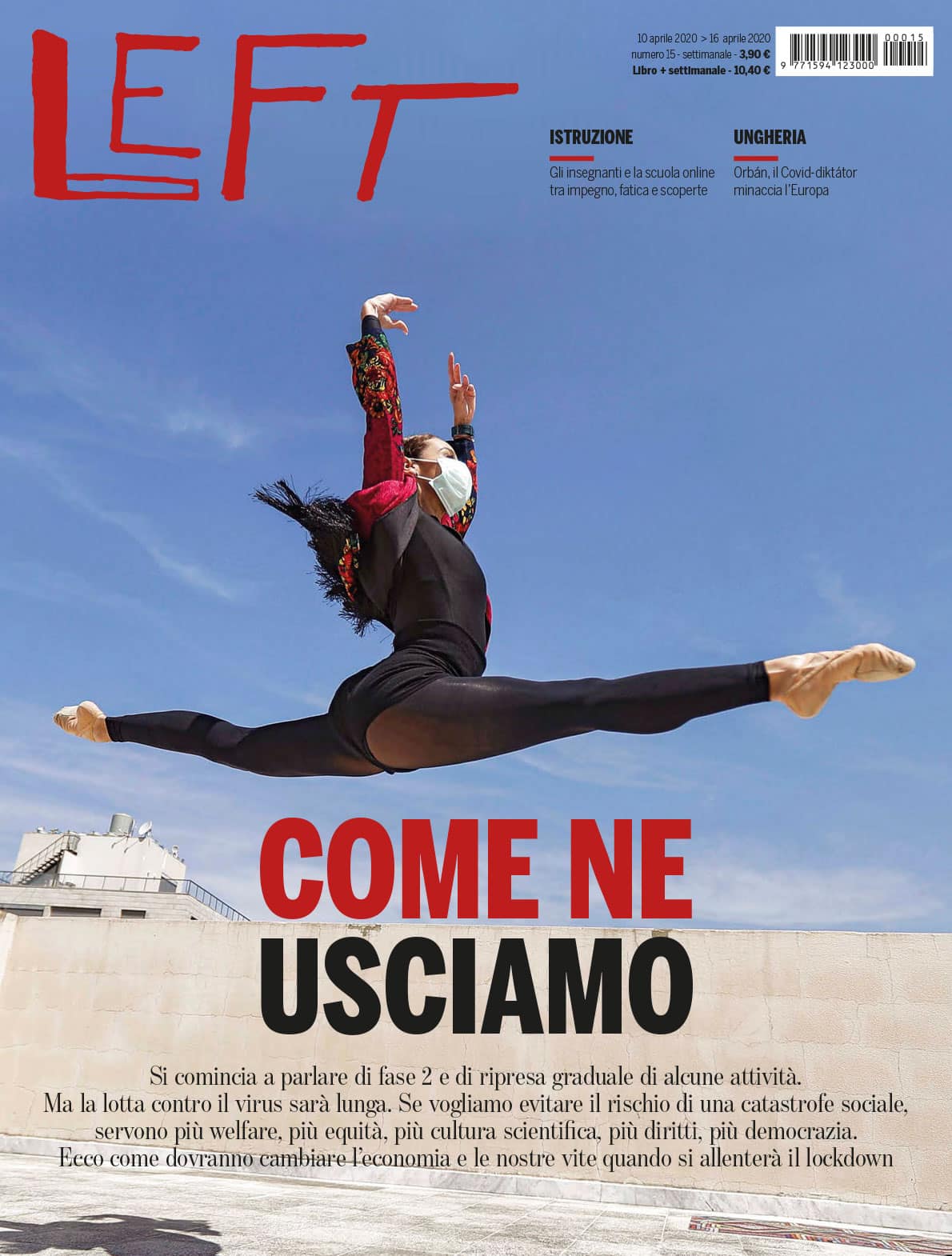Thousands are still dying each day because of the coronavirus, but Italy is now leading the downward trend with the rate of spread decreasing. Complacency would be a deadly mistake, but we have reason to believe that the end of the worst phase of the battle is near. However, as Keynes said, after winning the war, there is still a chance to lose the peace. Europe is facing a multiplicity of crises, each potentially deadlier than the corona crisis: a crisis of economic valuation, a health crisis, a democratic crisis and an environmental crisis. As a former progressive MP in Hungary, now an academic living in Italy, I see some frightening similarities between the two countries – but some dim hopes too. There is no question: returning to business as usual will create more suffering than we have seen in the past month.
It is a sign of a profound valuation crisis that the economy allocates resources such that Amazon can hire 100,000 new employees while micro-enterprises that make up 95% of businesses in Italy are struggling to survive. The corona crisis has also thrown in the limelight the absurd gap between the incomes of people whose work secures the foundation of society and the profits of the gamblers of the global financial casino and the barons of big business. As a result of this profound valuation crisis, the coronavirus found Italy as one of the most unequal countries in Europe: the ratio of the income of the top 20% compared to the income of the bottom 20% has risen from 5.4 to 6.5 between 2008 and 2018. The same is true for Hungary. Between 2010 and 2017, the social income support of the top 10% grew by 30.7% and declined by 15.6% for the bottom 10% in real value: a massive redistribution from the bottom to the top. As a consequence, Hungary is now the most unequal country in East-Central Europe. Unequal countries face worse ill health.
In addition to inequality, both Italy and Hungary saw a steep rise in precarious employment and in-work poverty. Hungary experienced massive deindustrialisation during the 1990s while hoping that investments from Europe’s core would offset this trend. It partly did but employment remained strikingly low until 2012. Western assembly plants represent the most competitive sector of Hungary’s economy but domestic companies have been falling behind. Which means that domestic value added is extremely low: the majority of value generated in Hungary flows back to the West. In addition, transnational corporations contribute to rising income inequality.
Italy has been experiencing similar deindustrialisation recently: employment in industry and industrial production declined between 2008 and 2018, as the country is losing out to global – and Eastern European – competition. The number of Italians living at risk of poverty grew from 11.2 million to 12.3 million between 2008 and 2018. The young have been hit particularly hard by labour market turmoil in both countries, leading to extreme levels of youth unemployment (43% in Italy in 2014, 28% in Hungary in 2012). Both countries saw a positive turn with declining unemployment in the past few years, but the price was high: a rise in atypical, precarious employment. Italy saw a profound jump in part-time and fixed-term employment. Labour market protection has been slashed in Hungary as well. Thus, the corona crisis hit not just an unequal but a highly precarious labour force in both countries. Precarious workers face worse ill health.
The crisis of valuation that is generated by markets and intensified by short-sighted governments is also linked to the looming health crisis. Some went as far as to demand human sacrifice on the altar of capitalism, implying that people are for the economy and not the economy for the people. However, several ‘developed’ countries have been facing health problems already before the corona crisis, such as a rise in the so-called diseases of despair, as well an obesity epidemic – one of the most important contributors to the leading causes of premature mortality: cardiovascular disease and cancer. The power of big food companies, the increased anxiety generated by reduced predictability and growing inequalities all contribute to these chronic health problems. Economic crises ‘add the finishing touches’: deindustrialisation, recession and austerity kill tens of thousands of people.
Despite its obvious adverse consequences, Italy has been trapped in a perpetual austerity regime since the 1990s and saw deep cuts to its health care budget (down from 7.4% of GDP in 2010 to 6.8% in 2018). Even worse, the number of acute care hospital beds was halved during the past 20 years. Maintaining a primary budget surplus since the beginning of the 1990s did not help to bring down debt. Austerity and recurring economic crises have killed Italy’s growth prospects, which actually increased the country’s debt burden. Hungary also experienced dramatic cuts to health care, slashing health expenditure from 5.7% of the GDP in 2006 to 4.7% in 2018. The adverse health consequences of underfunded public services became painfully evident during the corona crisis.
The Italian government at least tries to help employees with a job guarantee and a freeze of layoffs. Hungary’s PM Orbán did precisely the opposite: he suspended the labour code to force workers and employers into ‘flexible’ solutions. Hungary is the last country that has not introduced a job guarantee program. And it has one of the worst unemployment insurance schemes in the world that provides assistance for a bare three months to the unemployed. It seems that Hungary’s government is bent on exploiting the corona crisis to deepen inequality and shovel further resources towards the country’s new corrupt aristocracy.
The global race to the bottom on taxation is a main factor behind the austerity trap. Taxes on capital have declined in both countries between 2008 and 2018, while taxes on consumption – that hurt low-income groups more – have gone up. Quite perversely, both Orbán and Salvini, politicians that like to see themselves as alternatives to the global neoliberal-cosmopolitan elites, wholeheartedly embrace this downward tax race. Both of them are campaigning with flat income tax that costs billions in lost revenue, aggravates inequality, and leads to cuts in public services, without spurting economic growth. Orbán also fights avidly against European efforts to harmonise capital taxation, and transformed Hungary into a veritable tax haven with a flat 9% corporate tax.
The health of people and the health of democracy are intertwined. People left behind in regions with high mortality and prevalence of diseases of despair have a higher proclivity to support anti-establishment parties. Trump’s popularity in West Virginia in the US, the high share of Brexit votes in the most depressed and unhealthy towns in the UK hit by years of austerity, or the rising popularity of Lega Nord among workers in deindustrialised towns throughout Italy are cases in point. Strongman politics is on the rise throughout the world: the quality of democracy is declining globally. People failed by the economy, living in health-deprived areas, experiencing increased precarity, rising inequality and the prospect of downward mobility revolt against the status quo. But political strongmen promising a better life and ‘taking back control’ for these people, only exploit them behind the scenes.
However, political bullies like Orbán or Salvini are symptoms, not the root cause of the crisis of liberal democracy. Political bullies see a structural opportunity in these crises generated by today’s faulty economic structures and exploit it to move towards nationalist authoritarianism. That’s what Orbán did with his most recent power grab on the pretext of fighting the coronavirus. However, Hungary has not been a democracy for quite some time but a hybrid authoritarian regime. These multiple crises, the crisis of democracy, the valuation crisis, the growing obesity epidemic, the rise of deaths of despair, and the climate crisis all have a shared root: the power of big businesses, footloose capital, and the false myth that our societies need more market competition.
Does democratic politics have a chance? Politics missed the opportunity to make fundamental changes after the 2008 financial crisis. The corona crisis offers the same opportunity to learn. States have to be the protagonists in this drama if we want to avoid unnecessary suffering. The most valuable things – public goods such as health, sustainability or inclusive development – cannot be entrusted to the markets. They require a creative entrepreneurial state investing in the future.
However, the nation states cannot do this alone. Today’s crises require international, at least European, solutions. Yet, it is unclear if the EU can live up to the challenge. After staring into the deep national-chauvinist abyss, European elites took essential steps towards the solution at the beginning of April. Still no Eurobonds but the new SURE fund to finance job guarantee schemes is a baby step in the right direction. But it is a step that continues the usual visionless ‘muddling through’ strategy, doing just enough to avert the worst.
Instead of solutions that individualise responsibility at the level of nation states, Europe needs Eurobonds. The EU needs to curtail the power of footloose transnational capital and parasitic national bourgeoisies by closing down European tax havens. Europe’s elites need to curb the downward race to the bottom on taxation by introducing European capital taxes and international financial transaction taxes. Europe needs to secure funding for a brave European Green New Deal to kick off an environmental revolution. And finally, the EU needs to allocate at least as much attention and firepower to safeguarding democratic quality as to enforcing austerity. Otherwise, Europe will continue to tumble from crisis to crisis. There is no solution to the intertwined crises of today without more European solidarity and more progressive politics.
These measures might seem revolutionary for a centrist. However, challenging times require revolutionary solutions. The future is progressive, or it is dead.
Dr Gabor Scheiring is a research fellow at Bocconi University, Milan. He obtained his PhD from the University of Cambridge, where he also worked as a research associate. His research focuses on the human price of global economic change and on how this lived experience of class is related to illiberalism. In the 2000s, he was an active member of green and global justice movements. As a founder of a progressive party, he served as a member of the Hungarian Parliament between 2010 and 2014. Recent publications:
Recent publications: Scheiring, G., Azarova, A., & Irdam, D. 2020. Analysing the health impact of economic change: Insights from a multi-level retrospective cohort study. SAGE Research Methods Cases. doi:10.4135/9781529711189
Scheiring, G. 2019. “Dependent development and authoritarian state capitalism: Democratic backsliding and the rise of the accumulative state in Hungary“, Geoforum, Published online: 5 September 2019, DOI: 10.1016/j.geoforum.2019.08.011
Leggila subito online o con la nostra App
SCARICA LA COPIA DIGITALE






